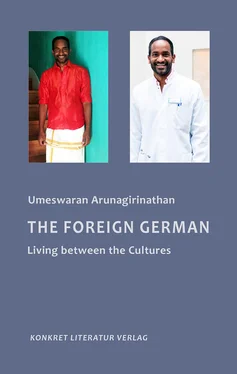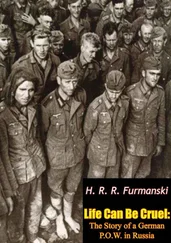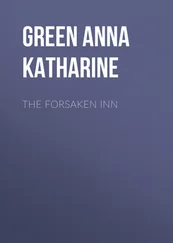Marriages happen traditionally within the same caste. For parental permission for the marriage of a son or daughter it is, beside profession and family, above all else caste membership that is decisive. I cannot at all understand how people from the upper castes, who have fled to Europe and America during the war and wash the plates of strangers, clean toilets and sometimes must clean the behinds of people in their care, can still cling fast to this rigid, intolerant, unreasonable caste system. How can they stick to being members of upper castes, when it comes to marriage. And this after so much misery and mutually scattered havens during the civil war.
Just so absurd I think it is that before the marriage ceremony the parents of the bride have to promise the groom’s parents a dowry. The bride’s family must provide a certain sum of money, or a house, or gold, or sometimes all of this together. This amount of the dowry depends on the groom’s position.
Also before my sister’s wedding, my father had to provide a house, gold, the payment of the wedding expenses and 5000 Euros as dowry. This promise he was not able to keep. For me it was very unpleasant that every time I visited my sister, I was held responsible for the sum still owed my brother in law. I was a student at that time and finally, my studies through, a nursing assistant in the ward and what I earned above that, I sent my parents at the end of the month,. With additional jobs during vacations as helper or promoter of optical businesses I earned money for the weddings of my sisters.
I was very grateful to my younger brother, who in the meantime lived in New York, that he was able to pay the remainder of the promised dowry just before my father’s visit to London. Otherwise my father would not have been able to meet his son-in-law without embarrassment, otherwise he would have lost face and honor. Many Tamils who now live in Europe or the USA marry women from Sri Lanka. Many parents are happy that this way, without the help of smugglers, they can bring their daughters to Europe or the USA. For this, the men’s families require a high dowry. Marriage is a lucrative business. This traditional thinking with its restrictions and intolerance, is the culture my parents will force upon me, and it estranges me more and more from my family. I feel closer to Germany and its society; my new homeland, than to Tamil culture, and live as a normal citizen of this land.
My parents still see their Tamil child in me. They don’t realize that the roots of a little tree, that have been transplanted from one land to another, continue to grow in the new country and will get bigger under the earth. That the roots will be nourished by the new land and formed by it, no one sees. They only think that this tree, its outside, is the true tree, and continue to see a tree from Sri Lanka. They forget that this tree carries much of the new homeland in itself.
What I experienced in London left me very sad. For years I had longed to see my parents. To see them again, whom I had loved at age 12, had been my greatest desire. I felt anger and despair that their arrival had been the reason I feel a stranger in my own family. A wonderful family was torn apart by the civil war. The children live in four different places in the world, five countries in one family. My parents are Sri Lankans, my sister Vaani is a Canadian, and Nala an English woman, my brother Jana is an American and I am a German.
After a week in London came the day of farewell. We stood in front my sister’s house. I embraced my father. That seemed visibly to demand too much from him. My mother, on the contrary, hugged me quite as a matter of course. Both of them told me to take care of myself. They repeated once again how important it was that I should marry and start a family.
I was thankful that my sister made our reunion in London possible. And I was glad that we had been able to fulfill my father’s most heartfelt wish.
After 16 years of longing for my parents, I felt myself now an adult man, a stranger to them. I parted from them with words “See you again”, (auf Wiedersehen). I couldn’t know that this would be the last time I would see my father. Now, when I close my eyes, I see an old man, sick and unhappy. How could I have made my father happy by agreeing to a marriage that would have made me unhappy for my whole life?
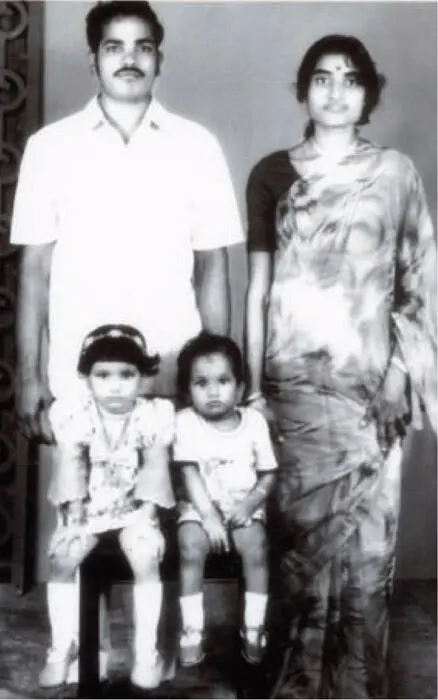
Umes with his parents and his deceased sister Ruji, 1979
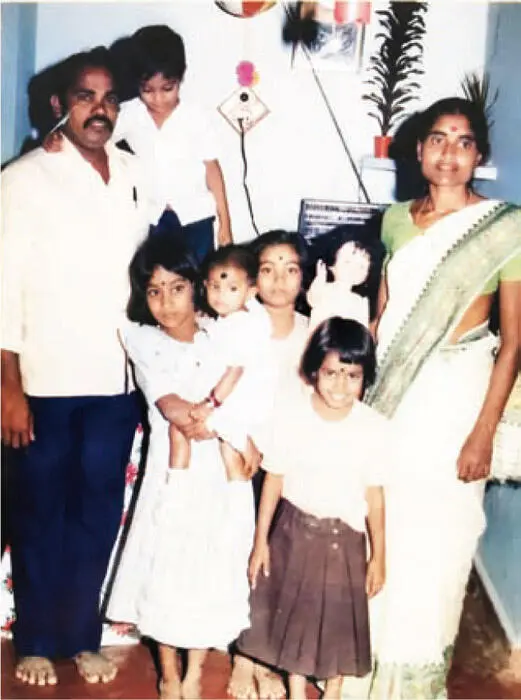
His whole family, 1988
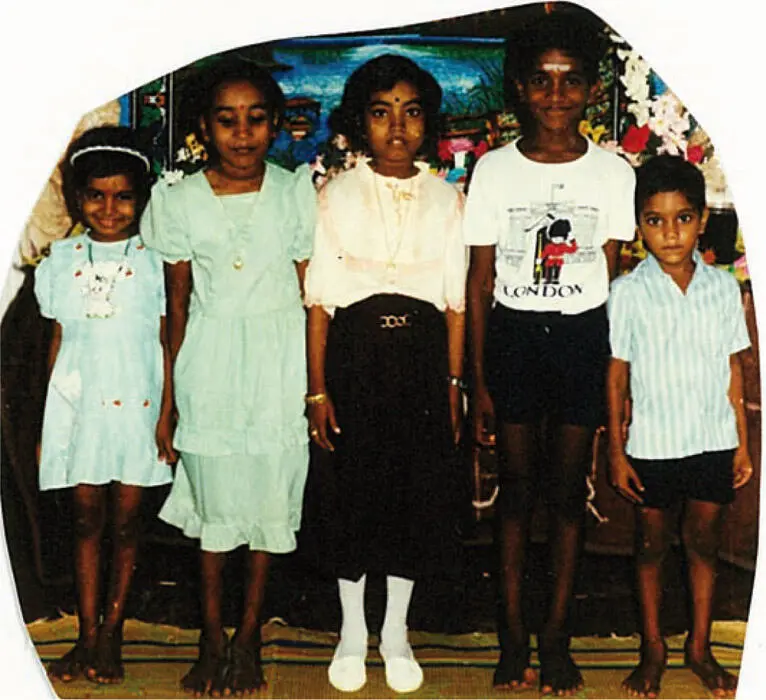
Umes with his siblings, 1989
WE WERE FOUR CANDIDATES. One even came with suit and tie, although the day before we had, at his suggestion, decided to appear quite informal at the examination. Only in shirt and pants. A kind of egoistic personality disorder, I thought. We were all very nervous. The last written exam, the so-called hammer exam, we had already successfully passed. Now only the results of this oral exam separate us from being a doctor.
After about 30 minutes of fearful waiting, the examiners called us in. We had all passed! The fellow student in a suit had even received a One. (A). Outside, waited my friends and student colleagues: Freddy, the Fredericks family. Isabel and Madlen with their children, who all called me Uncle Umes. They brought a special non-alcoholic sparkling wine for me. The parents had come for the other candidates, for me my friends were my family. Of course it would have been marvelous if my parents had been there to share the fulfillment of the dream of my life – becoming a doctor. I took my Nokia cell phone with its little antenna out of my pocket and called my parents in Sri Lanka. My father answered.
“Dad, it’s me, Umes. I passed my exam, now I’m a doctor.” I felt my father’s joy on the phone, he said: “You have managed to become a doctor, despite so many difficulties. We are all so proud of you.” I was the happiest I had ever been. It was the first time my father said he was proud of me. Unfortunately I had to end the call quickly as a telephone call to Sri Lanka was then rather expensive.
I didn’t have much time to celebrate or relax. In a week’s time already, I was to to take up a position as assistant physician at the University heart center in Hamburg-Eppendorf. I was happy and thankful that I had gotten this position. Ever since I had worked as a temporary assistant in the heart surgery in Luebeck during my studies, I had been fascinated by heart surgery.
As a non-German, at first I was not given certification, but rather “a permit to engage in medical practice.”
I remember well that day that I got the call from the secretary of Professor Reichenspurner at the University heart center. I was sitting already in bus number 9, on my way home from the University Library. She informed me that I was invited to a personal interview and described the way to the heart surgery in East House 70 on the site or the University Clinic in Eppendorf.
I was very excited and worried about what I should wear. My only suit that I had bought for 20 Euros from a second-hand shop for a Un iball, seemed inappropriate for the introductory interview, but I had no money for a new suit. My colleague Alexia, with whom I had studied everyday the last months before the exam, was able to help. She asked her boyfriend to lend me one of his. He agreed. As I already had suitable shoes and a shirt, all that was missing was a tie. Alexia always knew how to dress well, and she also knew how men should dress. We went shopping together and bought a blue tie with grey-white stripes. Very serious, matching well her boyfriend’s suit. It was fabulous, wearing a Hugo-Boss suit. I felt good in it. On the day of the interview I took the regional express from Luebeck to Hamburg. It only cost me 5 Euros, as I was able to travel with a group ticket.
Читать дальше
